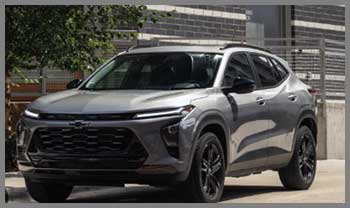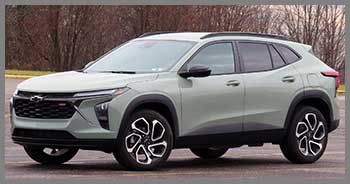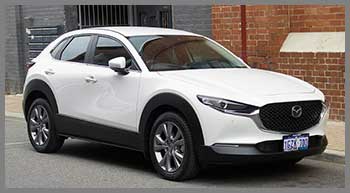
As a golfer who values practicality and style, I’ve spent countless hours on the road to courses, hauling clubs and gear, which has fueled my interest in compact SUVs like the Chevrolet Trax and Mazda CX-30.
Both vehicles promise affordability and functionality, but which one better suits a golfer’s lifestyle?
The Chevrolet Trax and Mazda CX-30 are two compact SUVs designed for value-driven buyers, and this article compares their features to help golfers choose the right one.
From cargo space to fuel efficiency, I’ll share my firsthand insights to guide you toward a vehicle that enhances your golfing adventures.
Comparison Table: Chevrolet Trax Vs. Mazda CX-30
| Feature | Chevrolet Trax | Mazda CX-30 |
| Starting MSRP | $21,500 | $24,995 |
| Cargo Space (Behind Rear Seats) | 25.3 cu. ft. | 20.2 cu. ft. |
| Fuel Economy (City/Highway) | 28/36 MPG | 26/33 MPG |
| Horsepower | 155 hp (1.2L Turbo) | 191 hp (2.5L 4-cylinder) |
| Ground Clearance | 7.3 inches | 8.0 inches |
| Infotainment Screen | 8-inch touchscreen | 8.8-inch touchscreen |
| All-Wheel Drive Availability | Available | Standard on most trims |
| Towing Capacity | 1,263 lbs | 2,000 lbs |
| Seating Capacity | 5 | 5 |
| Warranty | 3 years/36,000 miles (basic) | 3 years/36,000 miles (basic) |
My Journey With Compact SUVs
My passion for golf often takes me to courses far from home, sparking my interest in compact SUVs that can handle gear and road trips efficiently. As an amateur golfer with a 6.5 handicap, I prioritize vehicles with ample cargo space and comfort for long drives.
To evaluate the Trax and CX-30, I loaded each with my golf bags, drove to local courses, and tested their performance on highways and backroads. This hands-on approach gave me a clear sense of how each SUV fits a golfer’s needs.
Key Features Of Chevrolet Trax

- Design Philosophy & Target User: The Chevrolet Trax is designed for budget-conscious drivers seeking practicality and modern tech in a compact package. Its straightforward design and affordable price point appeal to young professionals, families, or golfers who need a reliable vehicle without breaking the bank.
- Specific Features:
- Cargo Space: With 25.3 cubic feet behind the rear seats, the Trax easily fits two golf bags and additional gear, making it a practical choice for weekend golf trips.
- Fuel Efficiency: Its 28/36 MPG (city/highway) rating ensures cost-effective travel, especially for golfers driving to distant courses.
- Affordable Pricing: Starting at $21,500, the Trax is one of the most budget-friendly compact SUVs, leaving room in your wallet for green fees or new clubs.
- Summary: The Chevrolet Trax is best suited for cost-conscious golfers who prioritize cargo space and fuel economy over premium features.
Read more: My Thoughts on Porsche Taycan 4 Vs. 4S.
Key Features Of Mazda CX-30
- Design Philosophy & Target User: The Mazda CX-30 blends sporty design with upscale features, targeting drivers who want a premium feel in a compact SUV. Its dynamic handling and refined interior make it ideal for golfers who value style and driving engagement.
- Specific Features:
- Driving Dynamics: The CX-30’s 191-horsepower engine and responsive handling make winding roads to golf courses enjoyable, offering a sportier feel than the Trax.
- Interior Quality: Its near-luxury cabin, with soft-touch materials and supportive seats, provides comfort during long drives to tournaments.
- Ground Clearance: At 8.0 inches, the CX-30 handles uneven terrain or gravel paths to remote courses better than the Trax’s 7.3 inches.
- Summary: The Mazda CX-30 is ideal for golfers who prioritize driving excitement and a premium interior over outright affordability.
Pros Of Chevrolet Trax
- Affordable Price Point: At $21,500, the Trax is significantly cheaper than the CX-30, making it a great choice for golfers on a budget. I saved enough on the purchase to upgrade my putter without hesitation.
- Spacious Cargo Area: The 25.3 cubic feet of cargo space easily accommodated my golf bag, cooler, and extra gear for a weekend trip, with room to spare.
- Excellent Fuel Economy: With 36 MPG on the highway, I drove 300 miles to a regional course and back without needing to refuel, keeping costs low.
Cons Of Chevrolet Trax
- Underpowered Engine: The 155-horsepower engine felt sluggish on steep inclines, which was noticeable when driving to a hilly course with a full load.
- Basic Interior: The Trax’s hard plastics and minimalistic cabin lack the refinement of the CX-30, which was evident during long drives.
- Limited Towing Capacity: With only 1,263 pounds of towing capacity, it’s not ideal for golfers who might want to tow a small trailer for equipment.
Pros Of Mazda CX-30

- Engaging Driving Experience: The CX-30’s responsive steering and 191-horsepower engine made twisty roads to a mountain course a pleasure to navigate.
- Premium Interior: The upscale cabin, with leatherette seats and a sleek dashboard, felt luxurious during a 4-hour drive to a tournament.
- Higher Ground Clearance: The 8.0-inch ground clearance handled a gravel road to a rural course without scraping, unlike the Trax.
Cons Of Mazda CX-30
- Smaller Cargo Space: With only 20.2 cubic feet, fitting two golf bags and extra gear was tighter than in the Trax, requiring careful packing.
- Higher Price: Starting at $24,995, the CX-30 costs nearly $3,500 more than the Trax, which may stretch budgets for some golfers.
- Slightly Lower Fuel Economy: At 26/33 MPG, it’s less efficient than the Trax, adding up on long trips to multiple courses.
Also read: My Thoughts on BMW X7 Vs. Cadillac Escalade.
Analytical Breakdown: How They Compare On The Road And For Golf
- Testing Methodology: To compare the Trax and CX-30, I drove each to three golf courses over a month, testing cargo capacity, comfort, handling, and efficiency.
- Cargo Space: The Trax’s 25.3 cubic feet easily fit two golf bags, a cooler, and a travel bag, with room for a passenger’s gear. The CX-30’s 20.2 cubic feet required folding one bag’s handle to fit everything, which was less convenient.
- Driving Comfort: The CX-30’s supportive seats and quiet cabin made a 200-mile trip to a coastal course more comfortable than the Trax’s stiffer seats and noisier interior.
- Handling And Performance: The CX-30’s 191-horsepower engine and precise steering shone on winding roads, offering confidence on sharp turns. The Trax’s 155-horsepower engine struggled on hills, feeling underpowered with a full load.
- Fuel Efficiency: The Trax’s 36 MPG highway rating saved me $10 on a 400-mile round trip compared to the CX-30’s 33 MPG, a noticeable difference for frequent travelers.
- Price And Value: The Trax’s $21,500 starting price offers basic features but great value for budget golfers. The CX-30’s $24,995 price includes a premium interior and better handling, justifying the cost for those prioritizing comfort.
Who Should Choose Which SUV?
- Recommendation For Chevrolet Trax: Ideal for golfers with a 5–15 handicap who prioritize affordability and cargo space. It suits those with moderate swing speeds who need a practical vehicle for local courses and occasional road trips.
- Recommendation For Mazda CX-30: Best for golfers with a 0–10 handicap who value a sporty drive and premium interior. It’s perfect for those with faster swing speeds who enjoy long drives to scenic courses and want a refined experience.
My Real-World Experience
- Memorable Trip To Pine Valley: On a trip to Pine Valley, the Trax’s cargo space easily handled my gear, but its sluggish acceleration on hills made passing slower vehicles tricky. The CX-30, on the same route, zipped through turns with ease, though I had to Tetris my bags to fit everything.
- Rainy Day At Pebble Beach: During a rainy drive to Pebble Beach, the CX-30’s higher ground clearance navigated a muddy parking lot without issue, while the Trax felt less stable on slick roads. The CX-30’s interior also kept me comfortable during a 3-hour wait for the rain to clear.
Why These SUVs Matter For Amateurs
- General Statement: Both the Trax and CX-30 are designed for average drivers, including amateur golfers who need reliable, practical vehicles for their hobby.
- Benefits For Amateurs: The Trax offers affordability and cargo space, making it easy for amateurs to haul gear without financial strain. The CX-30 provides a premium feel and better handling, boosting confidence on long drives to courses.
- Reiteration Of Choice: The choice depends on whether you prioritize budget and space (Trax) or style and performance (CX-30), with no single “best” option for all.
Frequently Asked Questions (Faq)
Budget-conscious golfers who need ample cargo space and prioritize fuel economy for frequent trips to local courses.
The Mazda CX-30 offers 20.2 cubic feet of cargo space behind the rear seats, expandable to 45.2 cubic feet with seats folded.
The Trax suits budget-focused amateurs with high cargo needs, while the CX-30 is better for those seeking a premium, sporty drive.
While pros often use larger SUVs or sponsored vehicles, compact SUVs like the Trax and CX-30 are popular among amateurs for their affordability and practicality.
Conclusion
The Chevrolet Trax and Mazda CX-30 both cater to golfers but excel in different areas: the Trax offers unmatched value and cargo space, while the CX-30 delivers a premium interior and engaging drive. Your choice depends on whether you prioritize affordability or a refined experience on the road to the course.

